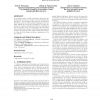Free Online Productivity Tools
i2Speak
i2Symbol
i2OCR
iTex2Img
iWeb2Print
iWeb2Shot
i2Type
iPdf2Split
iPdf2Merge
i2Bopomofo
i2Arabic
i2Style
i2Image
i2PDF
iLatex2Rtf
Sci2ools
ATAL
2007
Springer
2007
Springer
On the robustness of preference aggregation in noisy environments
In an election held in a noisy environment, agents may unintentionally perturb the outcome by communicating faulty preferences. We investigate this setting by introducing a theoretical model of noisy preference aggregation and formally defining the (worst-case) robustness of a voting rule. We use our model to analytically bound the robustness of various prominent rules. The results show that the robustness of voting rules is diverse, with different rules positioned at either end of the spectrum. These results allow selection of voting rules that support preference aggregation in the face of noise. Categories and Subject Descriptors F.2 [Theory of Computation]: Analysis of Algorithms and Problem Complexity; I.2.11 [Artificial Intelligence]: Distributed Artificial Intelligence—Multiagent Systems; J.4 [Computer Applications]: Social and Behavioral Sciences—Economics General Terms Algorithms, Theory, Economics Keywords Computational complexity, Voting
| Added | 07 Jun 2010 |
| Updated | 07 Jun 2010 |
| Type | Conference |
| Year | 2007 |
| Where | ATAL |
| Authors | Ariel D. Procaccia, Jeffrey S. Rosenschein, Gal A. Kaminka |
Comments (0)

